 Gokhale nominee for Weintraub award. Congratulations to Nandan Gokhakle on being selected as MGM’s nominee for the Weintraub award, this award recognizes outstanding achievement during graduate studies in the biological sciences.
Gokhale nominee for Weintraub award. Congratulations to Nandan Gokhakle on being selected as MGM’s nominee for the Weintraub award, this award recognizes outstanding achievement during graduate studies in the biological sciences.
Nandan’s thesis work focuses on understanding RNA regulatory controls of viral infection. Specifically, he studies how the RNA modification N6-methyladenosine (m6A) on viral and host RNAs regulates infection by viruses in the Flaviviridae family. Nandan found that m6A on the hepatitis C virus RNA genome negatively regulates viral particle production by facilitating a competition between the viral capsid protein and cellular m6A “reader” proteins for viral RNA packaging into virions (Gokhale et al., 2016). This work described a new regulatory mechanism of viral infection, and reveals that m6A acts on viral RNAs to regulate distinct stages of their life cycles. Nandan has also identified infection-induced changes in the cellular m6A-epitranscriptome which indicate that m6A exerts transcript-specific effects to influence the fate of cellular mRNAs and ultimately affect viral infection (Gokhale, McIntyre et al., 2019). Together, these exciting findings are illuminating how m6A dynamically regulates the host response to RNA virus infection and why it matters.
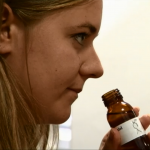 Claire Awarded K99/R00. Congratulations to Claire De March, postdoc in Hiro Matsunami lab, on her K99/R00 application being recommended for funding by the NIH. Claire’s research focuses on the understanding of molecular mechanisms related to the perception of odors. Since her thesis, she has mastered the protein reconstruction tools by homology modeling and molecular dynamics simulations to identify a uniform activation mechanism, common to all mammalian odorant receptors. She is particularly interested in investigating the role of conserved amino acid patterns in odorant receptors and how that defines their identity within the GPCR family. Claire tests the mechanistic hypotheses emitted by her theoretical models using in vitro approaches that was learned in her post-doctorate laboratory at Duke University in the lab of Pr. Hiroaki Matsunami. She uses the synergistic aspect of the theoretical and experimental approaches to obtain a reliable study model that allows her to answer major mechanistic questions related to the perception of odors. Claire’s postdoctoral training allied with her previous expertise gives Claire an understanding of olfaction from an atomic level odorant molecules recognition to the perception of an odor and the emotion it triggers.
Claire Awarded K99/R00. Congratulations to Claire De March, postdoc in Hiro Matsunami lab, on her K99/R00 application being recommended for funding by the NIH. Claire’s research focuses on the understanding of molecular mechanisms related to the perception of odors. Since her thesis, she has mastered the protein reconstruction tools by homology modeling and molecular dynamics simulations to identify a uniform activation mechanism, common to all mammalian odorant receptors. She is particularly interested in investigating the role of conserved amino acid patterns in odorant receptors and how that defines their identity within the GPCR family. Claire tests the mechanistic hypotheses emitted by her theoretical models using in vitro approaches that was learned in her post-doctorate laboratory at Duke University in the lab of Pr. Hiroaki Matsunami. She uses the synergistic aspect of the theoretical and experimental approaches to obtain a reliable study model that allows her to answer major mechanistic questions related to the perception of odors. Claire’s postdoctoral training allied with her previous expertise gives Claire an understanding of olfaction from an atomic level odorant molecules recognition to the perception of an odor and the emotion it triggers.
 Congratulations Sue Jinks-Robertson on being nominated as the Blue Devil of the Week. Sue was nominated by her colleagues for having an intriguing job and going above and beyond to make a difference at Duke. To read more, click here.
Congratulations Sue Jinks-Robertson on being nominated as the Blue Devil of the Week. Sue was nominated by her colleagues for having an intriguing job and going above and beyond to make a difference at Duke. To read more, click here.


Espenchied and Gokhale recipients of the 2019 Chancellor’s Award for Research Excellence (CARE). Congratulations to Ted Espenchied and Nandan Gokhale on receiving this award, this award acknowledges their hard work as a graduate student, including the scientific discoveries and publications they have contributed to, as well as the positive impact they have had on lab, departmental, and institutional culture.
Ted Espenschied completed his PhD in July 2019 under the mentorship of John Rawls, PhD, associate professor of Molecular Genetics and Microbiology. Ted’s dissertation, “Chemical and Microbial Regulation of Epithelial Homeostasis and Innate Immunity,” focused on investigating 1) how cells of the intestine sense and respond to foreign compounds (such as pharmaceuticals), and 2) how signals from the indigenous microbiota influence the development and function of neutrophils (cells of the innate immune system that protect animals from invading pathogens). A portion of this work was recently published in PNAS, where he described intestinal epithelial cell shedding as a novel protective response to pharmaceutical-induced injury.
Nandan’s thesis work focuses on understanding RNA regulatory controls of viral infection. Specifically, he studies how the RNA modification N6-methyladenosine (m6A) on viral and host RNAs regulates infection by viruses in the Flaviviridae family. Nandan found that m6A on the hepatitis C virus RNA genome negatively regulates viral particle production by facilitating a competition between the viral capsid protein and cellular m6A “reader” proteins for viral RNA packaging into virions (Gokhale et al., 2016). This work described a new regulatory mechanism of viral infection, and reveals that m6A acts on viral RNAs to regulate distinct stages of their life cycles. Nandan has also identified infection-induced changes in the cellular m6A-epitranscriptome which indicate that m6A exerts transcript-specific effects to influence the fate of cellular mRNAs and ultimately affect viral infection (Gokhale, McIntyre et al., 2019). Together, these exciting findings are illuminating how m6A dynamically regulates the host response to RNA virus infection and why it matters.
A reception in honor of award recipients will be held on October 23rd starting at 6:30pm at the Washington Duke Inn.
 Yadav receives Young Scientist Award. Vikas Yadav, a Postdoc in Joe Heitman’s lab, receives Young Scientist awards from two science academies – National Academy of Science, India (NASI) and Indian National Science Academy (INSA). The awards (INSA Medal for Young Scientist and NASI-Young Scientist Platinum Jubilee) are being given for his research work during his PhD with Prof. Kaustuv Sanyal at JNCASR, Bengaluru, India in a collaboration with the Heitman lab. The awards are considered to be the highest recognition of promise, creativity and excellence in a young Scientist. He characterized centromeres in the human fungal pathogen, Cryptococcus neoformans and identified the role of RNAi machinery in the regulation of centromeres length and structure. This work along with his other contributions was published in PNAS, PLoS biology, mBio and mSphere. Please click here to read more on this accomplishment.
Yadav receives Young Scientist Award. Vikas Yadav, a Postdoc in Joe Heitman’s lab, receives Young Scientist awards from two science academies – National Academy of Science, India (NASI) and Indian National Science Academy (INSA). The awards (INSA Medal for Young Scientist and NASI-Young Scientist Platinum Jubilee) are being given for his research work during his PhD with Prof. Kaustuv Sanyal at JNCASR, Bengaluru, India in a collaboration with the Heitman lab. The awards are considered to be the highest recognition of promise, creativity and excellence in a young Scientist. He characterized centromeres in the human fungal pathogen, Cryptococcus neoformans and identified the role of RNAi machinery in the regulation of centromeres length and structure. This work along with his other contributions was published in PNAS, PLoS biology, mBio and mSphere. Please click here to read more on this accomplishment.
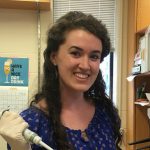 Hoye Awarded a F32 from NINDS. Mariah Hoye, a postdoc in Debby Silver’s lab, was recently awarded a F32 from NINDS for her work on a new intellectual disability gene, DDX3X, which codes for an RNA helicase. Previous work in the lab found that depletion of Ddx3x during embryonic brain development led to more neural progenitors and less neurons in mice. Dr. Hoye is now using a conditional knockout mouse to better understand the unique requirements for Ddx3x in neural progenitors and neurons during brain development. Specifically, Dr. Hoye is interested in understanding how DDX3X controls neural progenitor fate decisions, as loss of Ddx3x impairs neurogenesis. As an RNA helicase, DDX3X functions in multiple aspects of RNA processing, but has a prominent role in translation initiation of mRNAs with highly structured 5′ UTRs. Dr. Hoye is employing a genome-wide translational analysis, ribosome footprinting, to identify mRNAs in neural progenitors which require DDX3X for their translation. Identifying these DDX3X-dependent mRNAs may inform mRNAs whose translation is required for neural progenitor fate decisions.
Hoye Awarded a F32 from NINDS. Mariah Hoye, a postdoc in Debby Silver’s lab, was recently awarded a F32 from NINDS for her work on a new intellectual disability gene, DDX3X, which codes for an RNA helicase. Previous work in the lab found that depletion of Ddx3x during embryonic brain development led to more neural progenitors and less neurons in mice. Dr. Hoye is now using a conditional knockout mouse to better understand the unique requirements for Ddx3x in neural progenitors and neurons during brain development. Specifically, Dr. Hoye is interested in understanding how DDX3X controls neural progenitor fate decisions, as loss of Ddx3x impairs neurogenesis. As an RNA helicase, DDX3X functions in multiple aspects of RNA processing, but has a prominent role in translation initiation of mRNAs with highly structured 5′ UTRs. Dr. Hoye is employing a genome-wide translational analysis, ribosome footprinting, to identify mRNAs in neural progenitors which require DDX3X for their translation. Identifying these DDX3X-dependent mRNAs may inform mRNAs whose translation is required for neural progenitor fate decisions.
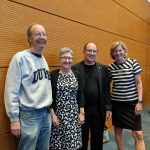 Celebration for Jinks-Robertson. The Department of Molecular Genetics and Microbiology held a special celebration to honor Sue Jinks-Robertson, PhD, Professor and co-Vice Chair in the department, on being elected to the National Academy of Sciences.
Celebration for Jinks-Robertson. The Department of Molecular Genetics and Microbiology held a special celebration to honor Sue Jinks-Robertson, PhD, Professor and co-Vice Chair in the department, on being elected to the National Academy of Sciences.
Please click here for more photos.
 Congratulations Jackie Lin. Please congratulate Jackie Lin on her acceptance to medical school at the University of California San Francisco. Jackie was an undergraduate researcher in the Heitman lab.
Congratulations Jackie Lin. Please congratulate Jackie Lin on her acceptance to medical school at the University of California San Francisco. Jackie was an undergraduate researcher in the Heitman lab.
 Passing of Dr. Wolfgang “Bill” Joklik. It is with great sadness to inform you that Dr. Wolfgang “Bill” Joklik, Virologists and James B. Duke Professor Emeritus of Molecular Genetics and Microbiology, died in Durham, North Carolina on July 7, 2019. He chaired the department for 25 years.
Passing of Dr. Wolfgang “Bill” Joklik. It is with great sadness to inform you that Dr. Wolfgang “Bill” Joklik, Virologists and James B. Duke Professor Emeritus of Molecular Genetics and Microbiology, died in Durham, North Carolina on July 7, 2019. He chaired the department for 25 years.
In 1981 Dr. Joklik founded the American Society for Viriology, the first scientific society specifically for virologists, and served a two-year term as its founding president.
Trained as a biochemist, Dr. Joklik was one of the pioneers of Molecular Virology. His work on the mechanisms underlying how viruses infect cells, multiply and cause disease laid the groundwork for the development of vaccines and antiviral agents. He published more than 250 research papers and reviews, and for 25 years was Editor-in-Chief of and a major contributor to Zinsser Microbiology, one of the two leading texts for medical students. He was Editor-in-Chief of Virology, the primary journal in its field, for eighteen years. He was a member/chairman of numerous Study Sections and Committees of the National Institutes of health and the American Cancer Society.
The Joklik Distinguished Lectureship, founded in MGM in 2010 is held annually to honor Dr. Joklik. The tenth annual Joklik lecturer this year will be Tom Shenk from Princeton. His talk will be presented at the annual MGM Departmental Retreat, September 6-8, 2019 in Wrightsville Beach, NC.
Please join in extending your deepest condolences to Dr. Joklik’s entire family and community of friends.
A mass of Christian burial for Dr. Joklik will be offered on Friday, July 12, 2019 at 10:00am at Immaculate Conception Catholic Church in Durham, NC.
To read the entire obituary, please click here .
The flags on Duke University’s campus have been lowered to half staff in honor of Dr. Joklik.
Dr. Joklik’s Lifetime Achievement Award Video (produced in 2013)
 Kutsch receives German Research Foundation (DFG) fellowship. Congratulations to Miriam Kutsch, postdoc in the Coers lab, on being awarded this fellowship. The 2-year DFG research fellowship is intended to support German early career scientists conducting innovative research at an international institution. Miriam’s research aims to understand an immune defense program directed at bacteria entering the host cell cytosol of human cells. In her research, she applies innovative biochemical and cell biological approaches to determine how the human defense protein GBP1 catches and conquers bacterial invaders.
Kutsch receives German Research Foundation (DFG) fellowship. Congratulations to Miriam Kutsch, postdoc in the Coers lab, on being awarded this fellowship. The 2-year DFG research fellowship is intended to support German early career scientists conducting innovative research at an international institution. Miriam’s research aims to understand an immune defense program directed at bacteria entering the host cell cytosol of human cells. In her research, she applies innovative biochemical and cell biological approaches to determine how the human defense protein GBP1 catches and conquers bacterial invaders.
 Sullivan named Associate Dean for Research Training. Beth Sullivan, PhD, Associate Professor of Molecular Genetics and Microbiology has been named Associate Dean for Research Training for the Duke School of Medicine. Dr. Sullivan, a human geneticist whose lab studies mechanisms of genome stability and centromere function, will oversee the Office of Biomedical Graduate Education and coordinate activities with the Office for Postdoctoral Affairs. She will provide leadership and broad strategic vision for all areas related to research training for biomedical Ph.D. students and postdoctoral appointees. Learn more at the Duke Med School blog: click here.
Sullivan named Associate Dean for Research Training. Beth Sullivan, PhD, Associate Professor of Molecular Genetics and Microbiology has been named Associate Dean for Research Training for the Duke School of Medicine. Dr. Sullivan, a human geneticist whose lab studies mechanisms of genome stability and centromere function, will oversee the Office of Biomedical Graduate Education and coordinate activities with the Office for Postdoctoral Affairs. She will provide leadership and broad strategic vision for all areas related to research training for biomedical Ph.D. students and postdoctoral appointees. Learn more at the Duke Med School blog: click here.
 JNCASR has been featured in the top 10 list of Nature Index normalized ranking. Jawaharlal Nehru Centre for Advanced Scientific Research (JNCASR) (www.jncasr.ac.in) is a multidisciplinary research institute situated in Bangalore, India. It is relatively young yet well-known around the world. The mandate of JNCASR is to pursue and promote world-class research and training at the frontiers of Science and Engineering covering broad areas ranging from Materials to Genetics. It provides a vibrant academic ambience hosting more than 300 researchers and around 50 faculty members. The Centre is funded by the Department of Science and Technology, Government of India and is a deemed university. JNCASR has been featured in the top 10 among the academic instituions in a recently published Nature Ranking (normalized) 2018 (https://www.nature.com/articles/d41586-019-01924-x). Kaustuv Sanyal’s group (www.jncasr.ac.in/sanyal) at JNCASR collaborates extensively with Joe Heitman’sgroup in the Duke University Medical Center. This collaboration led to many discoveries and publications including a recent paper in PNAS that has been cosidered for JNCASR’s recent ranking.
JNCASR has been featured in the top 10 list of Nature Index normalized ranking. Jawaharlal Nehru Centre for Advanced Scientific Research (JNCASR) (www.jncasr.ac.in) is a multidisciplinary research institute situated in Bangalore, India. It is relatively young yet well-known around the world. The mandate of JNCASR is to pursue and promote world-class research and training at the frontiers of Science and Engineering covering broad areas ranging from Materials to Genetics. It provides a vibrant academic ambience hosting more than 300 researchers and around 50 faculty members. The Centre is funded by the Department of Science and Technology, Government of India and is a deemed university. JNCASR has been featured in the top 10 among the academic instituions in a recently published Nature Ranking (normalized) 2018 (https://www.nature.com/articles/d41586-019-01924-x). Kaustuv Sanyal’s group (www.jncasr.ac.in/sanyal) at JNCASR collaborates extensively with Joe Heitman’sgroup in the Duke University Medical Center. This collaboration led to many discoveries and publications including a recent paper in PNAS that has been cosidered for JNCASR’s recent ranking.
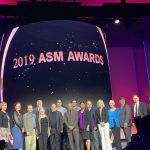
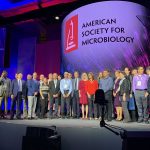
Heitman and Heaton receive ASM Award at the 2019 ASM Microbe Meeting. Joseph Heitman, M.D., Ph.D., James B. Duke Professor and Chair of the Department of Molecular Genetics and Microbiology and Nicholas Heaton, Ph.D., Assistant Professor in the Department of Molecular Genetics and Microbiology, received the 2019 ASM Microbe Award at the 2019 ASM Microbe conference in San Francisco, CA (June 20-25, 2019). ASM Microbe tweeted the awards here.
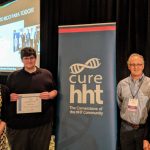 Congratulations Daniel Snellings. MGM graduate student Dan Snellings won first prize for best Oral Presentation in the Basic Sciences Category at the International Scientific Conference on Hereditary Hemorrhagic Telangiectasia, held in Rio Grande, Puerto Rico last week. This conference, held every two years, brings together physicians and scientists from around the world who are studying this hereditary vascular disease. Dan’s presentation showcased his discovery that the vascular malformations in HHT contain bi-allelic (germline plus somatic) mutations in the causative genes. His work overturns a long-standing but incorrect assumption that HHT is caused by haploinsufficiency of the gene product.
Congratulations Daniel Snellings. MGM graduate student Dan Snellings won first prize for best Oral Presentation in the Basic Sciences Category at the International Scientific Conference on Hereditary Hemorrhagic Telangiectasia, held in Rio Grande, Puerto Rico last week. This conference, held every two years, brings together physicians and scientists from around the world who are studying this hereditary vascular disease. Dan’s presentation showcased his discovery that the vascular malformations in HHT contain bi-allelic (germline plus somatic) mutations in the causative genes. His work overturns a long-standing but incorrect assumption that HHT is caused by haploinsufficiency of the gene product.
 Martinez featured on Duke Health News for a recent study published in Cell. David Martinez, PhD, Postdoctoral Associate in the Department of Molecular Genetics and Microbiology along with Dr. Sallie Permar conducted research focusing on improving maternal vaccines that also protect newborns. To read more about the research, click here. To read the full manuscript, click here.
Martinez featured on Duke Health News for a recent study published in Cell. David Martinez, PhD, Postdoctoral Associate in the Department of Molecular Genetics and Microbiology along with Dr. Sallie Permar conducted research focusing on improving maternal vaccines that also protect newborns. To read more about the research, click here. To read the full manuscript, click here.
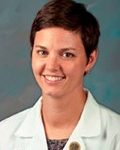 Congratulations to Audrey Odom. Congratulations to Audrey Odom, first undergraduate to work in Joseph Heitman’s lab and alumni of Duke University, on becoming the new Chief of the Division of Infectious Diseases at the Children’s Hospital of Philadelphia. Odom is currently an Associate Professor at Washington University School of Medicine, Department of Pediatrics. There her lab aims to improve the fundamental understanding of the basic molecular and cellular biology of the malaria parasite.
Congratulations to Audrey Odom. Congratulations to Audrey Odom, first undergraduate to work in Joseph Heitman’s lab and alumni of Duke University, on becoming the new Chief of the Division of Infectious Diseases at the Children’s Hospital of Philadelphia. Odom is currently an Associate Professor at Washington University School of Medicine, Department of Pediatrics. There her lab aims to improve the fundamental understanding of the basic molecular and cellular biology of the malaria parasite.
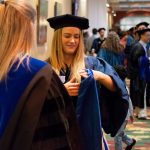 Congratulations to the MGM PhD graduates! They successfully defended between Summer 2018-Spring 2019 and celebrated with the Duke hoodingand Graduation ceremonies (May 11-12, 2019): Hilary Renshaw, Helen Lai, Rafael Campos, Sarah Jaslow, Dora Posfai, Shannon McNulty, David Martinez, Ross Walton, Arifuzzaman Mohammad, Ryan Finethy, Pohan Chen, Katelyn Walzer, Chien-Kuang Ding, Angelo Moreno, Allison Roder, Kaila Pianalto, Caitlin Murdoch and Justin Silverman. See pictures of the hooding ceremony here. Best wishes and much happiness to all of the graduates!
Congratulations to the MGM PhD graduates! They successfully defended between Summer 2018-Spring 2019 and celebrated with the Duke hoodingand Graduation ceremonies (May 11-12, 2019): Hilary Renshaw, Helen Lai, Rafael Campos, Sarah Jaslow, Dora Posfai, Shannon McNulty, David Martinez, Ross Walton, Arifuzzaman Mohammad, Ryan Finethy, Pohan Chen, Katelyn Walzer, Chien-Kuang Ding, Angelo Moreno, Allison Roder, Kaila Pianalto, Caitlin Murdoch and Justin Silverman. See pictures of the hooding ceremony here. Best wishes and much happiness to all of the graduates!
 Brook Heaton promoted to Assistant Research Professor. Congratulations to Brook Heaton on being promoted to Assistant Research Professor.
Brook Heaton promoted to Assistant Research Professor. Congratulations to Brook Heaton on being promoted to Assistant Research Professor.
Brook’s research interests focus on uncovering new viral restriction factors using CRISPR screening technology. By utilizing both WT influenza viruses and viral reporters she aims to find inhibitors that work at every step of the viral lifecycle.
 Jinks-Robertson elected to the U.S. National Academy of Sciences. Sue Jinks-Robertson, Professor and co-Vice Chair in the Department of Molecular Genetics and Microbiology, was one of two Duke Faculty members elected to the National Academy of Sciences, which is widely considered one of the highest honors a scientist can receive. Sue joins 2 other MGM faculty members, Tom Petes, PhD and Bill Joklik, PhD who were previously elected to the National Academy of Sciences. To read more about this honor click here.
Jinks-Robertson elected to the U.S. National Academy of Sciences. Sue Jinks-Robertson, Professor and co-Vice Chair in the Department of Molecular Genetics and Microbiology, was one of two Duke Faculty members elected to the National Academy of Sciences, which is widely considered one of the highest honors a scientist can receive. Sue joins 2 other MGM faculty members, Tom Petes, PhD and Bill Joklik, PhD who were previously elected to the National Academy of Sciences. To read more about this honor click here.
 Alspaugh appointed Vice Chair for Academic Affairs. Andrew Alspaugh, MD, Professor in Medicine (Infectious Diseases), agreed to serve as Vice Chair for Academic Affairs in the Department of Medicine effective April 1, 2019. Dr. Alspaugh will focus on the oversight of the Department’s appointment, promotion, and tenure process in conjunction whit the associate vice chair for academic affairs.
Alspaugh appointed Vice Chair for Academic Affairs. Andrew Alspaugh, MD, Professor in Medicine (Infectious Diseases), agreed to serve as Vice Chair for Academic Affairs in the Department of Medicine effective April 1, 2019. Dr. Alspaugh will focus on the oversight of the Department’s appointment, promotion, and tenure process in conjunction whit the associate vice chair for academic affairs.
 Steinbach elected to the Association of American Physicians. William Steinbach, MD, Professor in the Department of Pediatrics was elected into the Association of American Physicians (AAP) during a joint meeting on April 6th of the AAP, the American Society for Clinical Investigation (ASCI), and the American Physician-Scientists Association (APSA). Dr. Steinbach was one of 4 Duke physicians to receive this honor. To read more about Dr. Steinbach’s research, click here. Duke Pediatrics news Release.
Steinbach elected to the Association of American Physicians. William Steinbach, MD, Professor in the Department of Pediatrics was elected into the Association of American Physicians (AAP) during a joint meeting on April 6th of the AAP, the American Society for Clinical Investigation (ASCI), and the American Physician-Scientists Association (APSA). Dr. Steinbach was one of 4 Duke physicians to receive this honor. To read more about Dr. Steinbach’s research, click here. Duke Pediatrics news Release.
 Letourneau receives prestigious NSF GRFP Fellowship. Congratulations to Jeff Letourneau, MGM Graduate Student in Lawrence David’s lab, on being awarded this fellowship. The NSF Graduate Research Fellowship Program recognizes and supports outstanding graduate students in NSF-supported science, technology, engineering, and mathematics disciplines who are pursuing research-based Master’s and doctoral degrees at accredited United States institutions. Jeff is interested in understanding how complex communities of microbes cooperate and compete in the breakdown of dietary fiber in the human gut. In his research, he is using in vitro models to explore how habitual fiber consumption and gut microbiome composition affect an individual’s capacity to derive health benefits from fiber supplementation. He is also leading an upcoming human study to test the effects of increased fiber intake on behavior and cognition.
Letourneau receives prestigious NSF GRFP Fellowship. Congratulations to Jeff Letourneau, MGM Graduate Student in Lawrence David’s lab, on being awarded this fellowship. The NSF Graduate Research Fellowship Program recognizes and supports outstanding graduate students in NSF-supported science, technology, engineering, and mathematics disciplines who are pursuing research-based Master’s and doctoral degrees at accredited United States institutions. Jeff is interested in understanding how complex communities of microbes cooperate and compete in the breakdown of dietary fiber in the human gut. In his research, he is using in vitro models to explore how habitual fiber consumption and gut microbiome composition affect an individual’s capacity to derive health benefits from fiber supplementation. He is also leading an upcoming human study to test the effects of increased fiber intake on behavior and cognition.


Heitman and Cowen awarded a CIFAR research program on Fungal Kingdom: Threats & Opportunities
Joseph Heitman, MD, PhD, James B. Duke Professor and Chair of the Department of Molecular Genetics and Microbiology, Duke University and Leah Cowen, PhD, Professor and Canada Research Chair in Microbial Genomics and Infections and Chair of the Department of Molecular Genetics, University of Toronto received a Canadian Institute for Advanced Research (CIFAR) research program award in the interdisciplinary area of the Fungal Kingdom: Threats & Opportunities. Dr. Heitman and Dr. Cowen are co-directors for this new program, The Fungal Kingdom. The goal of the Fungal Kingdom program is to address threats of fungi to humans, animals, and plants/agriculture/food security, and to develop ways to mitigate these threats. More detail on the program is available here: https://www.cifar.ca/research/global-call/fungal-kingdom.
CIFAR is a Canadian-based, global charitable organization that assembles extraordinary research leaders to address science and humanity’s most significant challenges. CIFAR funds collaborative networks of scientists in the range of 15 to 25 investigators who come together over a sustained period of time (programs are funded in five-year increments) to solve important problems. The global call for applications (https://www.cifar.ca/research/global-call) announced 4 new programs and 4 returning programs. CIFAR received 120 proposed new programs, 12 finalists were chosen, and four were selected for funding, including the Fungal Kingdom: Threats & Opportunities program. To read the CIFAR news release click here.
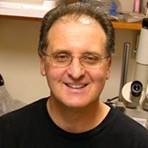 Marchuk receives 2019 Research Mentoring Award for basic science research. Douglas Marchuk, James B. Duke Professor, has been announced as the 2019 recipient of the School of Medicine Basic Research Mentoring Award. The Research Mentoring Awards were created in 2009 to honor outstanding research mentors in the Schools of Medicine and Nursing. Winners of this award demonstrate excellence in numerous aspects of mentoring, including accomplishments of individual mentees, programs implemented by the mentor, or by exceptional creativity in mentoring.
Marchuk receives 2019 Research Mentoring Award for basic science research. Douglas Marchuk, James B. Duke Professor, has been announced as the 2019 recipient of the School of Medicine Basic Research Mentoring Award. The Research Mentoring Awards were created in 2009 to honor outstanding research mentors in the Schools of Medicine and Nursing. Winners of this award demonstrate excellence in numerous aspects of mentoring, including accomplishments of individual mentees, programs implemented by the mentor, or by exceptional creativity in mentoring.
Doug was nominated for this award by his current and former students, fellows, and faculty colleagues who highlighted the various ways in which Doug has mentored trainees and junior faculty alike. Doug was co-Director of the University Program in Genetics and Genomics from 2002-2009 and director from 2009-2014, as well as the founding Director of the Division of Human Genetics. He has been the course director of the Human Genetics course (MGM732) for many years and founded the highly impactful grant writing course (MGM702) that has benefited students across the basic sciences and engineering departments. In his own lab, Doug has mentored many undergraduates, graduate students, MSTP students, and postdoctoral fellows. His trainees have gone on to successful careers in academic research, academic administration, patient advocacy, and medicine. Doug is also a staunch supporter of his faculty colleagues, particularly junior faculty, advocating for their research programs and professional development and serving on tenure committees. Doug’s tireless dedication to education, mentoring, training, and science is inspiring.
This well-deserved award will be presented to Doug by Dean Mary Klotman at the annual Spring Faculty Meeting to be held at the Doris Duke Center, Duke Gardens on Wednesday, May 8th at 5pm.
 Alspaugh receives 2019 Golden Apple Award. Andrew Alspaugh, MD, Professor of Molecular Genetics and Microbiology, has received the 2019 Golden Apple Award. The Golden Apple Awards are the highest teaching awards presented by the Duke University School of Medicine student body to recognize outstanding dedication to medical student education.
Alspaugh receives 2019 Golden Apple Award. Andrew Alspaugh, MD, Professor of Molecular Genetics and Microbiology, has received the 2019 Golden Apple Award. The Golden Apple Awards are the highest teaching awards presented by the Duke University School of Medicine student body to recognize outstanding dedication to medical student education.
Andy has been directing the medical school microbiology course for the past 6 years, and and describes it as a highlight of his experiences. Andy’s primary appointment is in the Department of Medicine, Division of Infectious Diseases, and his secondary appointment is in MGM. Andy is quite active in graduate student education and his lab alumni are excelling as independent investigator faculty members (Liz Ballou, the University of Birmingham), and in exemplary post-doctoral experiences (Teresa O’Meara with Leah Cowen and Suzanne Noble, and Kyla Ost with June Round), in addition to the current students in his lab (Kaila Pianalto who defended recently, Hannah Brown who recently received a priority score of 10 on her F31 NIH fellowship, and Calla Telzrow). Andy also serves as the co-director for the Tri-Institutional Molecular Mycology and Pathogenesis Program (Tri-I MMPTP) and was a course director for five years for the Molecular Mycology course at the Woods Hole Marine Biological Laboratory.
To read more, click here.
 Luftig honored for work by AAAS. Micah Luftig, Associate Professor in the Department of Molecular Genetics and Microbiology, was recently named a Fellow of the American Association for the Advancement of Science and was recognized for his contributions to biological science in the field of viral oncology at the AAAS meeting on February 16. To read more, click here.
Luftig honored for work by AAAS. Micah Luftig, Associate Professor in the Department of Molecular Genetics and Microbiology, was recently named a Fellow of the American Association for the Advancement of Science and was recognized for his contributions to biological science in the field of viral oncology at the AAAS meeting on February 16. To read more, click here.
 Brown awarded Jo Rae Wright Fellowship. Congratulations to Hannah Brown, MGM Graduate student in Alspaugh’s Lab, on being offered the Jo Rae Wright Fellowship for Outstanding Women in Science for academic year 2019-2020.
Brown awarded Jo Rae Wright Fellowship. Congratulations to Hannah Brown, MGM Graduate student in Alspaugh’s Lab, on being offered the Jo Rae Wright Fellowship for Outstanding Women in Science for academic year 2019-2020.
 Heitman awarded 2019 Edward Novitski Prize. Joseph Heitman, M.D., Ph.D., Chair and James B. Duke Professor in the Department of Molecular Genetics and Microbiology have received the 2019 Edward Novitski Prize for his work on human fungal pathogens and for indentifying the molecular targets of widely-used immunosuppressive drugs. Heitman will be presented with this prize at the upcoming 30th Fungal Genetics Conference. Click here for the 2019 Edward Novitski Prize announcement.
Heitman awarded 2019 Edward Novitski Prize. Joseph Heitman, M.D., Ph.D., Chair and James B. Duke Professor in the Department of Molecular Genetics and Microbiology have received the 2019 Edward Novitski Prize for his work on human fungal pathogens and for indentifying the molecular targets of widely-used immunosuppressive drugs. Heitman will be presented with this prize at the upcoming 30th Fungal Genetics Conference. Click here for the 2019 Edward Novitski Prize announcement.